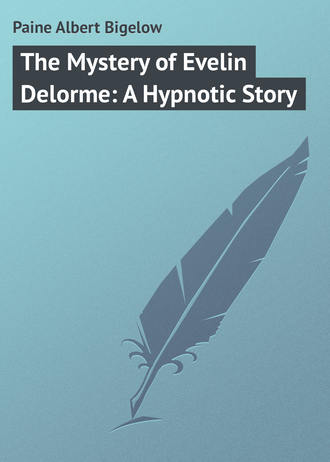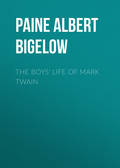
Paine Albert Bigelow
The Mystery of Evelin Delorme: A Hypnotic Story
Hastily removing his coat and the wide felt hat which he always wore on the street, he hung them on a rack in the adjoining room, and donning his velvet studio jacket, returned to the easel. Seizing his palette and brushes he fell to work rapidly, and with the enthusiasm of one who is in love with his task.
As he dashed on the broad sweeps of color from his palette, the background gradually assumed the effect of having faded away, and the rare face before it to have become a thing of flesh and blood. It was a marvel of skill. He had never done anything like this before. He became so absorbed in his work that he forgot the passing hours. The background of the portrait complete, he began adding touches of light and shadow and color to the drapery, to the hair, to the perfect features. He felt that he had never painted half so well. It seemed to him that he was inspired. He remembered the story of the artist who had painted the portrait of his beloved, drawing the tints so truly from her life, that when he had finished and turned to look at her with an exclamation of triumph on his lips, she was dead. It seemed to him at this moment that he was drawing his tints from her very life. That the intense workings of his brain must in some manner affect her own. He paused and his hand trembled. She was ill; what if she were to die! Pshaw! it was but a fable. He would paint the picture as truly, but only that the world might bow before the beauty of his mistress. He would exhibit it in Paris, and the multitude would worship the beautiful face that should win him a world-wide fame. Then he would take it away from the gaping throng and lay it, with the fame it brought him, at her feet.
The little clock on the mantel had long since chimed noon, and the hour hand had crept around the circle nearly to five before he finally laid aside his brushes and palette, and stepped back to view his finished work.
"It is wonderful – wonderful," he said, aloud. "Oh, my precious darling!"
There was a sound behind him as of some one choking. He turned and stood face to face with Evelin March. She was very pale, and her eyes burned like two stars.
"Who is that woman?" she said, fiercely.
He knew that she had overheard him, but he endeavored to address her calmly. He felt the cowardliness of his nature rising, and he cursed himself inwardly.
"I – I was not expecting you to-day, Evelin," he stammered; "to-morrow, you know, is the day for your sitting."
She did not take her eyes from the portrait; she had gone very close to it and as she turned upon him to reply there was a mingled look of terror and ferocity in her face.
"No, it is quite evident that you did not expect me, and that you were too much absorbed to remember or care when my sitting was due. And now you will please to answer my question. Who is that woman?"
What would he not have given, at that moment, to have had courage to say, "She is to be my wife;" but the magnificent fury of the woman before him, and the recollection of the shameful words of love he had spoken to her, overwhelmed him.
"She is a – a Miss Delorme, I believe; a sitter of mine," he managed to say at last.
"You believe! You lie! You know who she is, and you love her! You love that nun-faced baby! I heard your words. You believe – you" —
"Evelin, stop!"
"Don't speak to me, you traitor! 'Your precious darling.' Oh, I could kill her! I will kill her!"
He could not understand this wild fury, that seemed to be half inspired by a sort of terror. She had turned to the portrait again and was examining it, oblivious, for the moment, to all else. Then suddenly she turned upon him again with blazing eyes.
"I will kill her!" she hissed. "I could kill her with that," and she pointed to the jeweled stiletto on the wall.
She was so magnificent in her rage that he could not help admiring her through it all. The love for him which had aroused this tempest was so fierce that he felt his savage blood beginning to throb with an answering glow. He felt that once more he was about to be a traitor to all that was good within him. The ground was slipping from under his feet. The glamour of her voluptuous beauty was ruling his brain like the fumes of liquor. His eyes, too, were beginning to shine fiercely, but not with anger.
"Evelin," he said, "listen. You know I love you and have from the first. She is nothing to me. The words that you overheard were addressed only to the picture. It is my masterpiece. I was not thinking of the original." And down in his heart the small voice was whispering, "Coward – traitor – fool!"
But the hot blood of passion was sweeping through his veins, and he heeded it not. He put out his hand and laid it upon her arm.
"Don't touch me!" she said, angrily, but the expression in her eyes softened. He saw his advantage and followed it up.
"Evelin," he said, huskily, "I love you – I love you!" Again he laid his hand upon her and this time she allowed it to remain. They were standing near the curtained arch of the adjoining room. He parted back the heavy draperies, and gently drew her within.
The savage blood was rioting fiercely within him. He caught both her hands in his and drew her to his embrace. She hid her face upon his shoulder, and would not let him touch her lips. Other than this she made no further resistance. Half dragging, and half carrying her he approached a large divan that stood in a little alcove on the opposite side of the room. Suddenly he took her bodily in his arms and they sank down upon it together. For a second, only; then, with a quick powerful effort she threw him backward and sprang to her feet, staring about her with a wild, startled look in her eyes.
Goetze, wholly at a loss to account for the suddenness and fierceness of the resistance, was for a moment stunned. As he recovered himself and made a movement toward her, she gave him one quick, piteous look – a look that recalled to him suddenly and strangely the beautiful, innocent girl whom he had wronged and forgotten – the face of Eva Delorme– then, as if seized with sudden panic she sped from the room, out through the dim studio and into the dusky hall-way beyond.
He heard the opening and closing of the outside door, and knew that she was gone. Then the tide of reaction swept over him. The glamour of conquest had passed, and there remained only the shame, the treachery and the remorse.
With a curse of anguish he flung himself down upon the floor, and lay groveling with his face in the dust. The moments flew by unheeded. An hour passed. The electric lamps were turned on, and a white ray of light shot in through the half-curtained window. The little clock on the mantel chimed the hour.
The sound roused him. Starting to his feet he gazed stupidly about him for a moment as if undecided what to do, then seizing his hat from the wall rack he hurried out through the studio and the dark hall-way without pausing to remove his working jacket, or to lock the door. Out into the street where people were hurrying home, chattering and laughing, and glancing only for a second at the figure in the velvet studio coat and broad hat, wondering a little at the dark, intense face that flashed so swiftly past them toward the glare and confusion of the business center.
He did not know where he was going. He did not care. He was trying to get away from himself. He walked faster and faster; twice he started to run.
He was drawing nearer to the bustle of the city. Small shops were scattered along between the rows of brick dwellings, and at one corner the light of a saloon flared out upon the pavement. Entering, he called for brandy. The bar-keeper stared at him and set out a bottle and a glass. Twice he filled it to the brim and drank it off with hardly a pause between. Then, throwing down a silver dollar, he hastened out without waiting for change.
The shops were getting thicker and larger. Dwelling-houses were fewer and more old fashioned. Here and there newsboys were crying the evening papers. Street-cars, filled with lights and faces, rolled swiftly by him and in front of him, jangling their bells. The buzz and whirl of the city was around him. He was drawing near to its great, throbbing heart.
Splendid shop windows threw a flood of light upon the pavement, making it like day. The shouts of the newsboys and street venders, the jangling of the car-bells, the rushing cabs and carriages, the hurrying crowds, the brilliant lights, the liquor in his brain, all whirled together and sent the blood racing through his arteries, tingling to the surface now and again in burning waves of misery and shame.
People paused for a moment to look at the strange figure, and hurried on. Everybody was hurrying – hurrying somewhere. He, too, was hurrying, as one pursued by furies; but where?
Suddenly, in front of an illuminated window, he paused; why, he did not know. There was nothing there to attract him. It was a place where they sold shoes. Numberless shoes were arranged for display, and in the midst of them a little white lamp-globe revolving by clock-work with two words painted on it in black letters:
GENTLEMEN'S SHOES
He read the words over and over as the little globe came round, and round, and round. "Gentlemen's shoes – Gentlemen's shoes – Gentlemen's shoes." The thing fascinated him. It was such a funny little globe. It reminded him of a merry-go-round he had once ridden on as a child. He wondered how many times a day it spelled out the words, and if it kept on going, there in the dark, after the place was closed. Then he hurried on, but the little white globe and its black, flying letters were still before him. They had impressed their image upon his brain. More than once he repeated the words aloud. They seemed to have blended themselves into his whirling senses and become a monotonous undertone.
"Gentlemen's shoes – Gentlemen's shoes – Gentlemen's shoes."
Here and there he stopped at a saloon and drank. He drank deeply and the liquor was strong.
The lights were beginning to grow fewer. He had turned in his walk, and was leaving the whirl and glare behind him. He did not know what direction he had taken. He only knew that he was going, going, going, in a mad effort to get away from himself.
The people that passed him he did not see. He saw only the white face of Eva Delorme, and that piteous look in the eyes of the other, that had, in one instant, revived within him, and with ten-fold vigor, all the strange, torturing suspicions he had once felt regarding these two mysterious lives. The faces that turned to look at him, he did not notice; he saw only these two, and mingled with them, and whirling round, and round, and round, the little white globe with its black letters, "Gentlemen's shoes – Gentlemen's shoes – Gentlemen's shoes."
After a long time he noticed that he was passing a small suburban railway station. There was a bustle of preparation as though a train was expected to arrive. He crossed the shining steel tracks and entered. A number of people were inside, chattering, laughing and waiting. Waiting to go somewhere. Everybody was going somewhere – everybody but him. Suddenly a group in one corner attracted him as had the lighted window and the revolving globe.
A hatchet-faced woman, wearing a faded straw hat of antique pattern, a cloak to match, and a soiled and largely plaided dress, was vainly endeavoring to still the cries of a miserable babe swaddled in an assortment of dirty garments.
Two children, of ages evidently beginning at prompt and regular intervals from the one in her arms, extended from her at right-angles on the bench, their legs straddled about with a childish disregard of modesty. They were asleep – at least one of them was, and the other was equally silent.
By and by, the woman arose and walked the floor with the babe. At this, the child who was not asleep arose also and stared at its mother with wide, round eyes. Then, as she approached it and turned in her march, it began to follow her, keeping close behind and in step.
The other slept on unconsciously. The lamps flared and flickered; the babe, partially soothed, sobbed and moaned, and the squalid pair marched on.
Begotten in bliss – brought forth in suffering – retired in privation.
Suddenly there is a prolonged, shrill shriek in the night, a trampling of many feet, a shouting of discordant voices, and the midnight train is snorting at the platform.
Hastily the mother gathers up the sleeping child, and bidding the other cling close to her skirts, hurries out into the night, past the fiery-eyed Polyphemus, on toward the coaches behind.
The people that are going somewhere jostle against her in their haste to get into the coaches and secure seats. Mechanically the artist follows. Everybody is going somewhere; he will go, too.
The monster ahead begins to puff and grunt, and the bell that is fastened to its back, to ring wildly.
The men who are loading baggage shout and swear and hurl coarse jokes at each other, and the midnight train begins to move. The bell still clangs frantically, the demon puffs and grunts faster and faster, and the light from its one fearful eye penetrates farther and farther into the darkness ahead.
Faster, and faster, and faster – the sound of the wheels falling into a regular measure, until it has become a weird, rhythmical monotone.
"Gentlemen's shoes – Gentlemen's shoes – Gentlemen's shoes."
Then there is a momentary flare of light, a final, blood-curdling scream, and the one-eyed demon – the faded and soiled woman – the sobbing baby – the sleeping child – the marching child with the big, round eyes – the people who are going somewhere, and the artist who is going nowhere, are on their way.
He has taken a seat facing the faded woman, and is unconsciously studying her face. She is still hushing the babe to rest. On one side the sleeper is huddled up against her. On the other, next to the window and resting upon its knees, the child with the big, round eyes stares out into the darkness.
The coach is warm. The heat and the strong liquor are beginning to tell on him. The face before him begins to mingle with all sorts of impossible fancies. The roar of the flying train is in his ears, but it seems the roar of some mighty sea that is about to overwhelm him. The conductor, coming through, shakes his arm to rouse him.
"Tickets!"
"Oh, yes!" – he forgot. He thrusts a bill into the conductor's hand. "Keep the change, I will ride it out."
The drowsiness is again stealing upon him. He still sees the wretched face before him and is studying it; but always between them are those other faces – the face of Eva Delorme and of Evelin March – and the piteous, frightened look that rests now upon one, now upon the other, – and now the two are melting – melting into one, like the blending outlines of a dissolving view – and both fade out into the little white globe with its whirling black words, that the hum of the train flying through the night keeps repeating over, and over, and over, – "Gentlemen's shoes – Gentlemen's shoes – Gentlemen's shoes."






